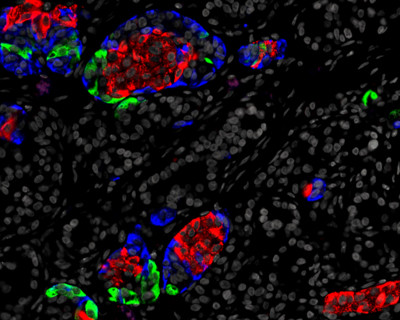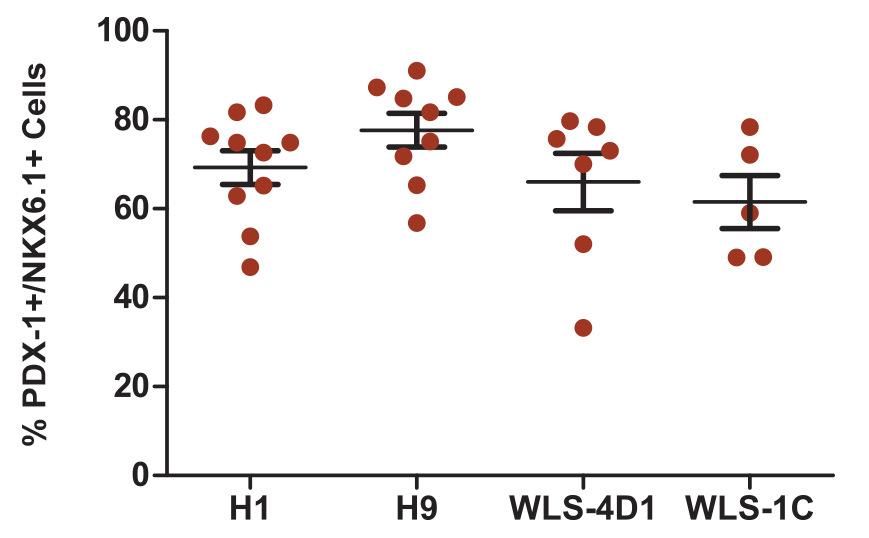
New Robust Kit for Efficient Generation of Functional Pancreatic Progenitor Cells
Introduction
Human embryonic stem (ES) or induced pluripotent stem (iPS) cells are powerful tools for studying developmental biology, disease modeling, and regenerative and personalized medicine. The ability to direct differentiation of human ES and iPS cells to the pancreatic lineage has introduced significant opportunities for pancreatic and diabetes research; however, generating pancreatic progenitor cells is a challenging and labor-intensive process that can be highly variable across pluripotent cell lines. The new STEMdiff™ Pancreatic Progenitor Kit is a convenient, easy-to-use and high-performance alternative; this kit efficiently and reproducibly generates functional pancreatic progenitor cells from multiple human ES and iPS cell lines. The resulting cells are capable of in vitro or in vivo maturation to both endocrine and exocrine pancreatic cell lineages (Figure 1).
Figure 1. Generate Functional Pancreatic Progenitor Cells that Mature into Endocrine and Exocrine Cells

The Research and Therapeutic Potential of Pancreatic Progenitor Cells
Pancreatic progenitor cells give rise to endocrine cells, which produce hormones to regulate blood glucose levels, and exocrine cells, which produce enzymes to aid in digestion and form pancreatic ductal tissue. Studying the mechanisms involved in the maturation of pancreatic progenitors, as well as factors that impact this process can provide insight into pancreatic development and disease. One area of concentrated research interest is beta cell development, with the goal of developing novel cell-based therapies for diabetes.
Can Pancreatic Progenitor Cells Reverse Diabetes?
One of the causes of diabetes is the autoimmune-mediated depletion of insulin-producing beta cells. While transplantation of cadaver-derived pancreatic islets (structures within the pancreas that comprise the endocrine compartment) has helped treat some patients, the lack of donor tissue limits the use of this therapy to a narrow population of diabetics. Human ES and iPS cell-derived pancreatic progenitor cells have shown the ability to mature into insulin-producing cells when transplanted in mice.2,3 Human clinical trials of stem cell therapies involving encapsulation and transplantation of pancreatic progenitor cells to treat type I diabetes are also underway.4-6 These studies hold great promise for the future of standard diabetes therapy and provide a practical example of the importance of a standardized protocol to generate pancreatic progenitor cells.
The Challenges in Generating Pancreatic Progenitor Cells
Differentiating human ES and iPS cells to pancreatic progenitor cells usually involves a multi-week differentiation protocol and several multi-component specialized culture media. If all goes well, one can expect to see >90% of the resulting cell population to express PDX-1, however observing co-expression of both PDX-1 and NKX6.1 is often a significant challenge. Co-expression of PDX-1 and NKX6.1 is indicative of functional pancreatic progenitor cells that are capable of maturing to both exocrine and endocrine cells. Obtaining a high yield of this cell population is crucial for downstream differentiation studies. Fortunately, the new STEMdiff™ Pancreatic Progenitor Kit yields 4-5 PDX-1+/NKX6.1+ pancreatic progenitors per input pluripotent cell across a variety of iPS and ES cell lines.
Why Use the STEMdiff™ Pancreatic Progenitor Kit?
The newest member of the STEMdiff™ family of easy-to-use kits for directed differentiation promotes efficient and reproducible differentiation of multiple human ES and iPS cell lines (Figure 2) to PDX-1+/NKX6.1+ pancreatic progenitor cells in two weeks. The kit uses simple combinations of basal media and stage-specific supplements to direct human ES and iPS cells through definitive endoderm, primitive gut tube and posterior foregut before reaching the pancreatic progenitor stage. The resulting stage 4 pancreatic progenitor cells are multipotent and can mature into exocrine and mono-hormonal endocrine cells. View more data here.
The STEMdiff™ Pancreatic Progenitor Kit is a robust directed differentiation kit that provides researchers with a standardized tool for pancreatic research, while supporting multiple applications, including in vitro or in vivo downstream differentiation to mature pancreatic cell types. If you have any questions regarding this kit, or any of the differentiation tools that STEMCELL offers, please contact us at stemdiff@stemcell.com.
Figure 2. The STEMdiff™ Pancreatic Progenitor Kit Functions Efficiently Across Multiple Human ES and iPS Cell Lines

The author has added the following after publication.
The WLS-4D1 and WLS-1C iPS cell lines were generated in a collaborator’s lab and we are unable to support the provision of these cells to others. The STEMdiff Pancreatic Progenitor Kit was designed to allow for efficient generation of PDX-1/NKX6.1 co-expressing cells regardless of the cell line used. There are several institutes and companies who can provide human iPS cells to academic researchers. This includes the Coriell Institute, WiCell and ATCC. We encourage users of the kit to test the product on these available lines and have confidence that they will observe the expected results. We will continue to add data on additional cell lines in our online material as those data become available. We recently hosted a webinar as part of our Pluripotent Learning Lounge, where Drs. Ray Dunn and Jamie Trott from the A*STAR Institute of Medical Biology, Singapore, talk about their research and show data using the STEMdiff™ Pancreatic Progenitor Kit.
Footnotes
-
1. Riedel M et al. (2012) Immunohistochemical characterization of cells co-producing insulin and glucagon in the developing human pancreas. Diabetologia 55(2): 372-81.
-
2. Kroon E et al. (2008) Pancreatic endoderm derived from human embryonic stem cells generates glucose-responsive insulin-secreting cells in vivo. Nat Biotechnol 26(4): 443-52.
-
3. Rezania A et al. (2014) Reversal of diabetes with insulin-producing cells derived in vitro from human pluripotent stem cells. Nat Biotechnol 32(11): 1121-33.
-
4. http://www.bioinformant.com/sernova-announces-agreement-with-ccrm-to-produce-specialized-cells-for-the-treatment-of-diabetes/
-
5. http://viacyte.com/clinical/clinical-trials/
-
6. http://www.janssen.com/cardiovascular-and-metabolism/betalogics